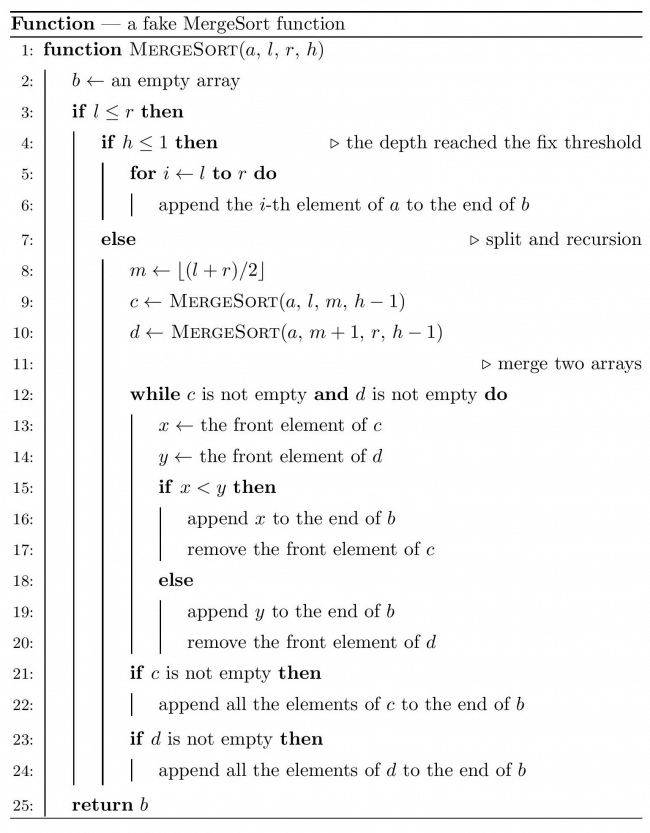Chouti thought about his very first days in competitive programming. When he had just learned to write merge sort, he thought that the merge sort is too slow, so he restricted the maximum depth of recursion and modified the merge sort to the following:

Chouti found his idea dumb since obviously, this “merge sort” sometimes cannot sort the array correctly. However, Chouti is now starting to think of how good this “merge sort” is. Particularly, Chouti wants to know for a random permutation $a$ of $1, 2, \ldots, n$ the expected number of inversions after calling MergeSort(a, 1, n, k).
It can be proved that the expected number is rational. For the given prime $q$, suppose the answer can be denoted by $\frac{u}{d}$ where $gcd(u,d)=1$, you need to output an integer $r$ satisfying $0 \le r<q$ and $rd \equiv u \pmod q$. It can be proved that such $r$ exists and is unique.
Input
The first and only line contains three integers $n, k, q$ ($1 \leq n, k \leq 10^5, 10^8 \leq q \leq 10^9$, $q$ is a prime).
Output
The first and only line contains an integer $r$.
Examples
input
3 1 998244353
output
499122178
input
3 2 998244353
output
665496236
input
9 3 998244353
output
449209967
input
9 4 998244353
output
665496237
Note
In the first example, all possible permutations are $[1,2,3],[1,3,2],[2,1,3],[2,3,1],[3,1,2],[3,2,1]$.
With $k=1$, MergeSort(a, 1, n, k) will only return the original permutation. Thus the answer is $9/6=3/2$, and you should output $499122178$ because $499122178 \times 2 \equiv 3 \pmod {998244353}$.
In the second example, all possible permutations are $[1,2,3],[1,3,2],[2,1,3],[2,3,1],[3,1,2],[3,2,1]$ and the corresponding outputs of MergeSort(a, 1, n, k) are $[1,2,3],[1,2,3],[2,1,3],[1,2,3],[2,3,1],[1,3,2]$ respectively. Thus the answer is $4/6=2/3$, and you should output $665496236$ because $665496236 \times 3 \equiv 2 \pmod {998244353}$.
Solution:
#include <bits/stdc++.h>
using namespace std;
int md;
inline void add(int &a, int b) {
a += b;
if (a >= md) a -= md;
}
inline void sub(int &a, int b) {
a -= b;
if (a < 0) a += md;
}
inline int mul(int a, int b) {
return (int) ((long long) a * b % md);
}
inline int power(int a, long long b) {
int res = 1;
while (b > 0) {
if (b & 1) {
res = mul(res, a);
}
a = mul(a, a);
b >>= 1;
}
return res;
}
inline int inv(int a) {
a %= md;
if (a < 0) a += md;
int b = md, u = 0, v = 1;
while (a) {
int t = b / a;
b -= t * a; swap(a, b);
u -= t * v; swap(u, v);
}
assert(b == 1);
if (u < 0) u += md;
return u;
}
int main() {
ios::sync_with_stdio(false);
cin.tie(0);
int n, k;
cin >> n >> k >> md;
if (k >= 20 || n <= (1 << (k - 1))) {
cout << 0 << '\n';
return 0;
}
int bc = (1 << (k - 1));
int small_size = n / bc;
int big_size = small_size + 1;
int big_cnt = n % bc;
int small_cnt = bc - big_cnt;
vector<int> blocks(bc);
for (int i = 0; i < n; i++) {
blocks[i % (int) blocks.size()]++;
}
map<int,int> mp;
for (int x : blocks) {
mp[x]++;
}
vector<int> fact(n + 1), inv_fact(n + 1);
fact[0] = inv_fact[0] = 1;
for (int i = 1; i <= n; i++) {
fact[i] = mul(fact[i - 1], i);
inv_fact[i] = inv(fact[i]);
}
/* auto C = [&](int n, int k) {
if (k < 0 || k > n) return 0;
return mul(fact[n], mul(inv_fact[k], inv_fact[n - k]));
};*/
int ans = 0;
for (int b1id = 0; b1id < bc; b1id++) {
int b = blocks[b1id];
add(ans, mul(mul(b, b - 1), inv(4)));
}
vector<int> sum_inv(n + 1);
for (int i = 0; i < n; i++) {
sum_inv[i + 1] = sum_inv[i];
add(sum_inv[i + 1], inv(i + 1));
}
for (int b1id = 0; b1id < bc; b1id++) {
int b1 = blocks[b1id];
if (b1 == small_size) small_cnt--;
else big_cnt--;
for (int x = 2; x <= b1; x++) {
if (small_cnt > 0) {
int aux = sum_inv[x + small_size];
sub(aux, sum_inv[x]);
int prob = mul(x - 1, aux);
add(ans, mul(small_cnt, mul(prob, inv(2))));
}
if (big_cnt > 0) {
int aux = sum_inv[x + big_size];
sub(aux, sum_inv[x]);
int prob = mul(x - 1, aux);
add(ans, mul(big_cnt, mul(prob, inv(2))));
}
}
if (b1 == small_size) small_cnt++;
else big_cnt++;
}
cout << ans << '\n';
return 0;
}

